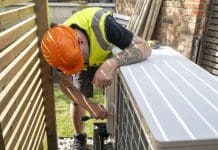Arup has vowed to carry out whole lifecycle carbon assessments for all its buildings projects and to withdraw from fossil fuels from next year
Adopting whole lifecycle carbon assessment will allow the global buildings sector to progress toward 50% carbon emissions reduction by 2030, argues Arup, and to contribute meaningfully to the Paris Agreement’s goal of preventing global warming from exceeding 1.5°C.
Arup believes the insights it will gain from conducting thousands of whole lifecycle carbon assessments each year, from April 2022, will help the built environment sector advance toward net zero.
It is also committed to developing a methodology to extend whole lifecycle carbon assessments to its infrastructure work for clients without delay.
‘The next step that must be taken’
Alan Belfield, chairman of Arup, said: “Whole lifecycle carbon assessment is the next step that must be taken to unlock decarbonisation of the built environment at scale.
“Our commitment to undertaking whole lifecycle carbon assessment for all of our buildings work means that for the first time we will have the data to share with our clients and with industry partners about the precise actions to be taken to decarbonise buildings – new or existing – most effectively.”
Cristina Gamboa, CEO of the World Green Building Council, commented: “Delivering net zero buildings requires transformative action by industry leaders.
“Arup’s decision to incorporate whole lifecycle carbon assessment for all of its buildings commissions, and on a global basis, is game-changing and it will help to accelerate the buildings sector’s progress toward net zero.
“Arup’s decision is precisely the type of advocacy we encourage signatories of WorldGBC’s Net Zero Carbon Buildings Commitment to take.
“The Commitment now incorporates requirements to address embodied carbon as a part of a whole lifecycle carbon approach.”
Arup’s commitment to whole lifecycle carbon assessment is accompanied by significant investment in learning, tools, and training for its global teams to embed standardised methods for assessing whole lifecycle carbon.
From next April, Arup’s energy commissions will focus entirely on low-carbon solutions, including wind, solar, hydroelectric, and hydrogen projects that it assesses as advancing progress toward a fully decarbonised future.
From 1 April 2022, Arup will not pursue any new energy commissions that support the extraction, refinement, or transportation of hydrocarbon-based fuel.

















